Noise Complaint Letter
[Your Name]
[Your Address]
[City, State, Zip Code]
[Email Address]
[Phone Number]
[Date]
[Recipient's Name]
[Recipient's Address]
[City, State, Zip Code]
Subject: Noise Complaint
Dear [Recipient's Name],
I hope this letter finds you well. My purpose in writing to you today is to express my concern regarding the ongoing noise disturbances that have been affecting my quality of life in the [neighborhood/apartment complex].
Over the past [duration], I have noticed an increasing level of noise emanating from your property, particularly during [specific times]. The noise includes loud music, shouting, machinery sounds, and other disruptive activities. Regrettably, this constant disturbance has had a negative impact on my ability to rest, concentrate, and enjoy the peaceful surroundings of my own home.
I believe that open communication is essential in addressing such matters. Therefore, before taking any formal action, I kindly request that you address this issue promptly and take measures to reduce the noise disturbances. Understanding that occasional noise is a part of everyday life, I hope we can find a reasonable compromise to ensure harmony among neighbors.
In accordance with the local noise regulations and the standard principles of good neighborly conduct, I urge you to be mindful of the noise levels and their potential impact on nearby residents. By doing so, we can maintain a comfortable living environment for everyone in the community.
If, after a reasonable period, the noise disturbances continue without improvement, I may have no choice but to escalate this matter to the appropriate authorities or the property management. I sincerely hope it does not come to that, and we can resolve this issue amicably.
Please feel free to contact me to discuss this matter further or to update me on any actions you are taking to address the noise concerns. I can be reached at [your phone number] or [your email address].
I appreciate your understanding and cooperation in resolving this matter. Let us work together to foster a peaceful and enjoyable living environment for all residents.
Thank you for your attention to this matter.
Sincerely,
[Your Name]
Formal Noise Complaint Letter to Neighbor
Subject: Noise Complaint Regarding Late Night Disturbances
Dear Neighbor,
I hope this message finds you well. I am writing to bring to your attention the ongoing noise disturbances coming from your apartment late at night, often after 11:00 PM. The volume and frequency of the noise have been making it very difficult for my family and me to rest properly.
I kindly request your cooperation in lowering the noise levels, particularly during late evening and nighttime hours. Please understand that we value being your neighbors and wish to maintain a good relationship, but the current level of noise is becoming unmanageable.
I appreciate your understanding and look forward to a quieter living environment for everyone.
Sincerely,
[Your Name]
Casual Noise Complaint Email to Neighbor
Subject: Quick Note About the Noise
Hi [Neighbor’s First Name],
I just wanted to drop you a quick note to let you know that the music from your place has been pretty loud late at night recently. I totally understand wanting to relax and have fun, but it’s been hard for me and my family to get proper sleep.
If you could lower the volume a bit during the late hours, I’d really appreciate it. I’m sure we can work this out without any problems.
Thanks a lot for your understanding!
Best,
[Your Name]
Serious Noise Complaint Letter to Landlord
Subject: Request for Action Regarding Ongoing Noise Issue
Dear [Landlord/Property Manager],
I am writing to formally lodge a complaint regarding ongoing noise disturbances in the building, particularly from the unit [specify apartment or location]. Despite previous informal requests to reduce the noise, the problem persists, especially during late night hours.
The constant disruption has significantly affected my ability to sleep and work, and it is creating a stressful living environment. I kindly request your immediate attention to this matter and for steps to be taken to resolve this issue.
Thank you for your prompt consideration. I look forward to your response and to a resolution that ensures peaceful living conditions.
Sincerely,
[Your Name]
Official Noise Complaint Letter to Authorities
Subject: Formal Noise Complaint Submission
To Whom It May Concern,
I am writing to file a formal complaint regarding excessive and recurring noise disturbances from [address or location]. The noise often occurs late at night and has become unbearable, affecting not only my household but also others in the community.
Previous attempts to resolve this issue directly have been unsuccessful. I am therefore requesting your intervention to address this ongoing problem. It is my hope that with your assistance, the matter can be resolved quickly and fairly.
Thank you for your time and support.
Sincerely,
[Your Name]
[Contact Information]
Heartfelt Noise Complaint Letter to Neighbor
Subject: Kindly Request for Quieter Evenings
Dear Neighbor,
I hope this letter finds you well. I understand that everyone has their own lifestyle, and sometimes we all make a little more noise than expected. However, I wanted to share with you that the noise levels from your unit in the evenings have been difficult for my family, especially for my children who need proper rest for school.
I am reaching out in hopes that we can work together to make our shared space more peaceful. I truly value being part of this community and would like to continue enjoying good neighborly relations.
Thank you for your understanding and cooperation.
Warm regards,
[Your Name]
Quick Noise Complaint Message to Building Manager
Subject: Noise Disturbance from Neighbor
Hi [Manager’s Name],
I wanted to quickly report that my neighbor in unit [number] has been playing very loud music late at night for the past week. It has become very disruptive.
Could you please look into this matter?
Thanks,
[Your Name]
Funny but Polite Noise Complaint Email
Subject: Can We Turn Down the Volume on the Rock Concert?
Hi [Neighbor’s First Name],
I didn’t know I was living next door to a live concert hall! While your music taste is great, it’s been a little too loud at night lately. My walls are thin enough that I feel like I’ve learned all the lyrics by heart.
I’d appreciate it if you could lower the volume after 10 PM so I can get some actual sleep. Thanks for your help in keeping things peaceful around here.
All the best,
[Your Name]
Preliminary Noise Complaint Letter (First Notice)
Subject: Friendly Request Regarding Noise Levels
Dear Neighbor,
This is just a friendly note to let you know that the noise from your unit has been quite noticeable recently, especially during the late evening hours. While I completely understand occasional celebrations or gatherings, the consistent noise has been challenging for me and my family.
This is not an official complaint, but I wanted to reach out first to see if we can resolve the issue amicably. I kindly ask for your cooperation in keeping the noise to a minimum during quiet hours.
Thank you for your understanding.
Sincerely,
[Your Name]
What is a Noise Complaint Letter and Why Do You Need It?
A noise complaint letter is a written document sent to neighbors, landlords, building managers, or authorities to formally address excessive noise issues.
Its purpose is to request a reduction in noise, maintain peace in the community, and create a record of the disturbance in case further action is required.
Who Should Write a Noise Complaint Letter?
- Tenants experiencing disturbances.
- Homeowners dealing with noisy neighbors.
- Residents in shared housing or apartments.
- Sometimes, a group of tenants may submit a joint complaint to strengthen the case.
Whom Should a Noise Complaint Letter Be Addressed To?
- Directly to the neighbor causing the noise.
- To the landlord or property manager if the neighbor is unresponsive.
- To housing associations, condo boards, or local authorities for official intervention.
- In extreme cases, law enforcement or municipal departments handling noise control.
When Should You Send a Noise Complaint Letter?
- After repeated disturbances, especially at night or during quiet hours.
- When informal verbal requests have not worked.
- Before escalating to legal or official authorities.
- After specific incidents that were particularly disruptive.
How to Write and Send a Noise Complaint Letter
- Clearly describe the problem, including times and frequency.
- Be polite and respectful but firm in your request.
- Mention any previous attempts to resolve the issue.
- Request specific changes (e.g., lower music volume at night).
- Send the letter via email, hand delivery, or certified mail for record-keeping.
Common Mistakes to Avoid in Noise Complaint Letters
- Using aggressive or insulting language.
- Writing vague complaints without specifics.
- Failing to mention dates and times.
- Not keeping a copy of the letter for your own records.
- Escalating too quickly without first attempting a friendly approach.
Elements and Structure of a Noise Complaint Letter
- Subject line or heading.
- Greeting.
- Clear description of the noise problem.
- Specific times, dates, or patterns.
- Reference to previous requests or attempts.
- Request for resolution.
- Polite closing statement.
Formatting Guidelines for Noise Complaint Letters
- Keep it concise but detailed (1–2 pages).
- Tone: polite, respectful, but firm.
- Formal letters for landlords or authorities, casual notes for neighbors.
- Always date the letter for record purposes.
- Avoid emotional language—stick to facts.
After Sending: What Should You Do Next?
- Wait for a reasonable response time (usually a few days).
- Document whether the noise problem continues.
- Follow up with another letter or escalate to management/authorities if necessary.
- Keep a written record for potential legal use.
- Continue being respectful even if frustration grows.
Pros and Cons of Sending a Noise Complaint Letter
Pros
- Creates a formal record of the disturbance.
- Encourages resolution without conflict.
- Shows professionalism and courtesy.
- Can be escalated later if needed.
Cons
- Neighbor may take offense even if politely written.
- May not always solve the problem.
- Escalation could strain relationships.
Tricks and Tips for Writing Effective Noise Complaint Letters
- Keep a noise log with dates and times before writing.
- Suggest compromises (e.g., reducing volume after 10 PM).
- Use calm, non-accusatory language.
- Deliver the letter at a neutral time, not during a heated moment.
- Involve other neighbors if the issue affects multiple people.
Compare and Contrast: Noise Complaint Letter vs. Direct Conversation
- Noise Complaint Letter: Provides a documented, formal approach; useful if issues persist.
- Direct Conversation: Friendly and immediate; may resolve small issues quickly.
- Alternative: Combining both methods—first try a conversation, then follow up with a letter if needed.

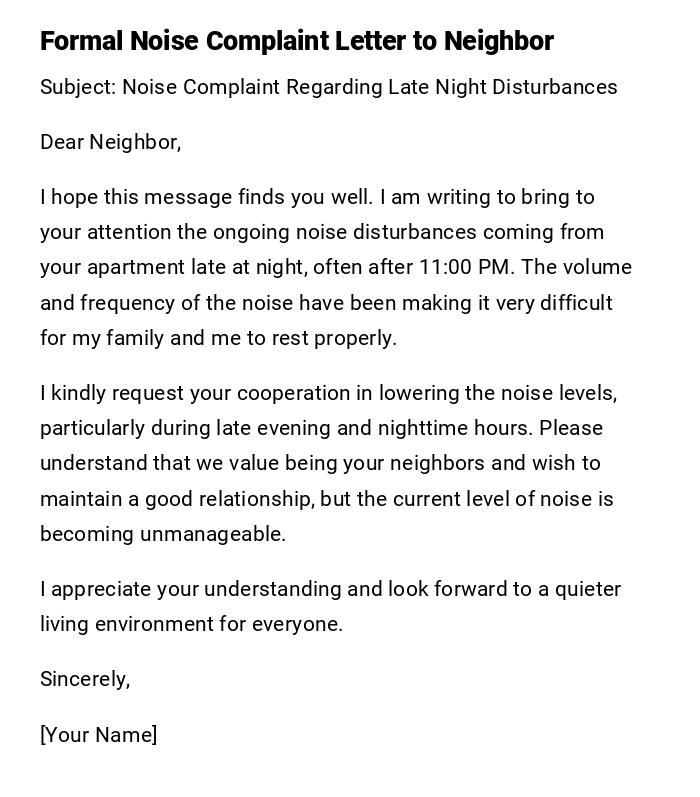
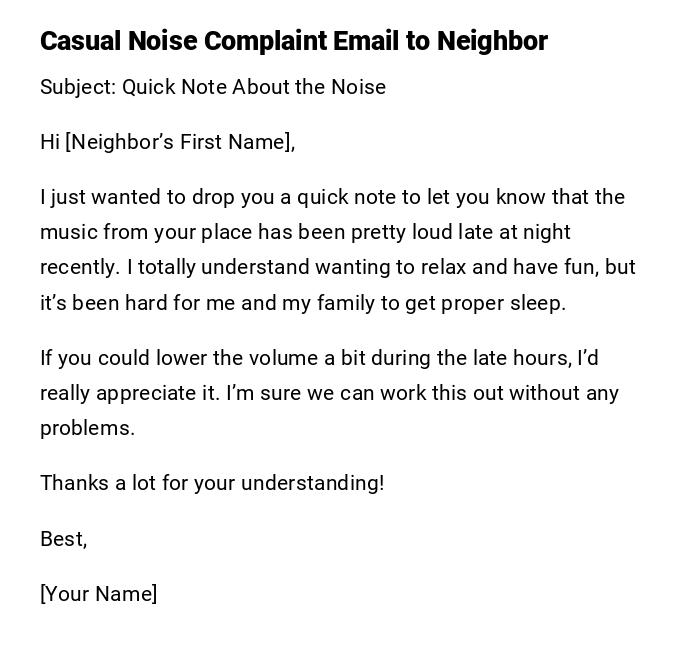
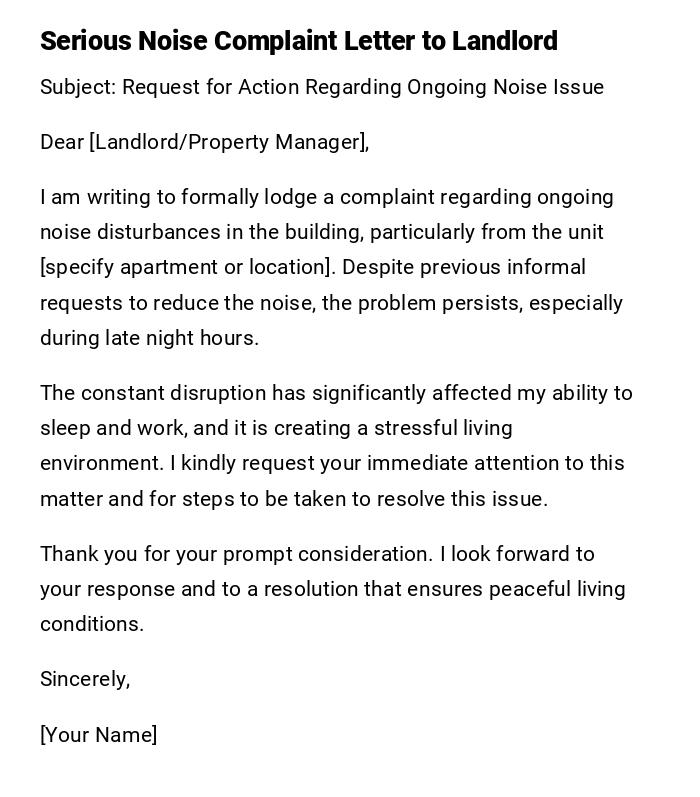
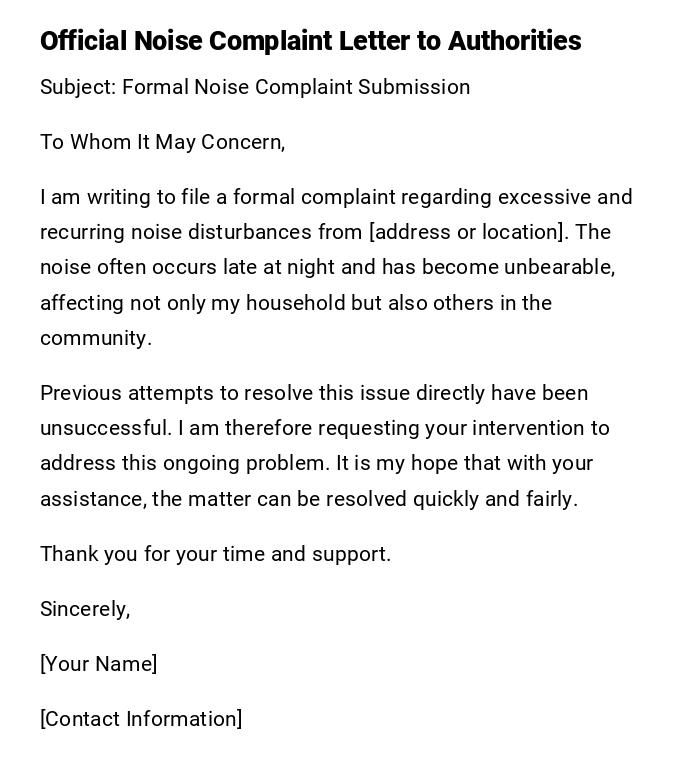
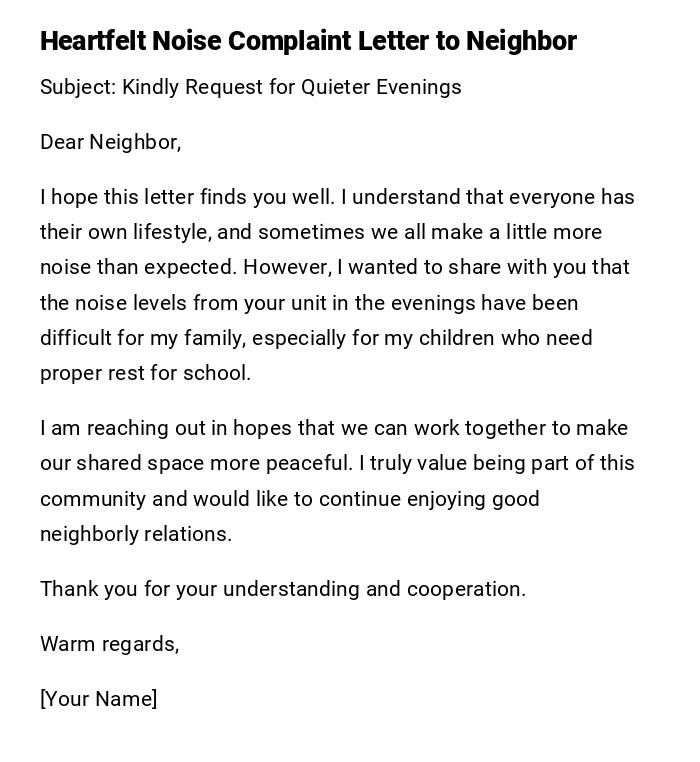
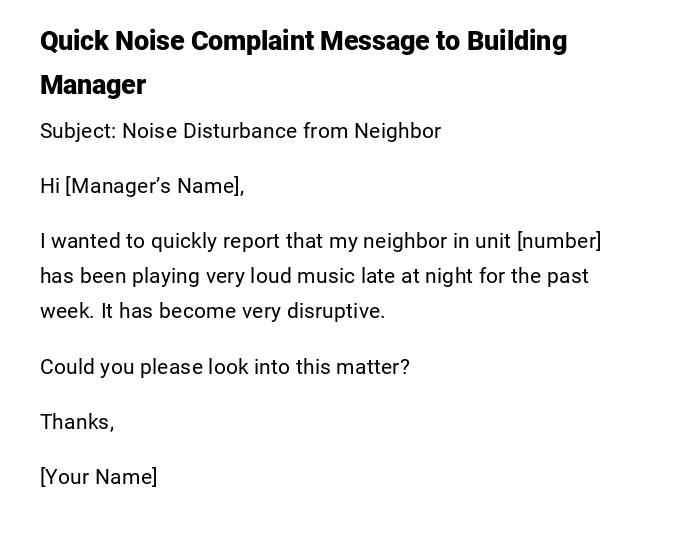
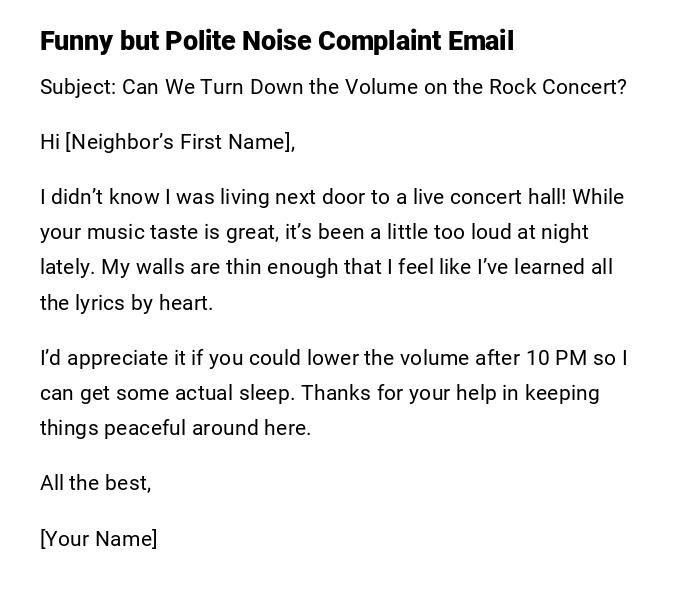
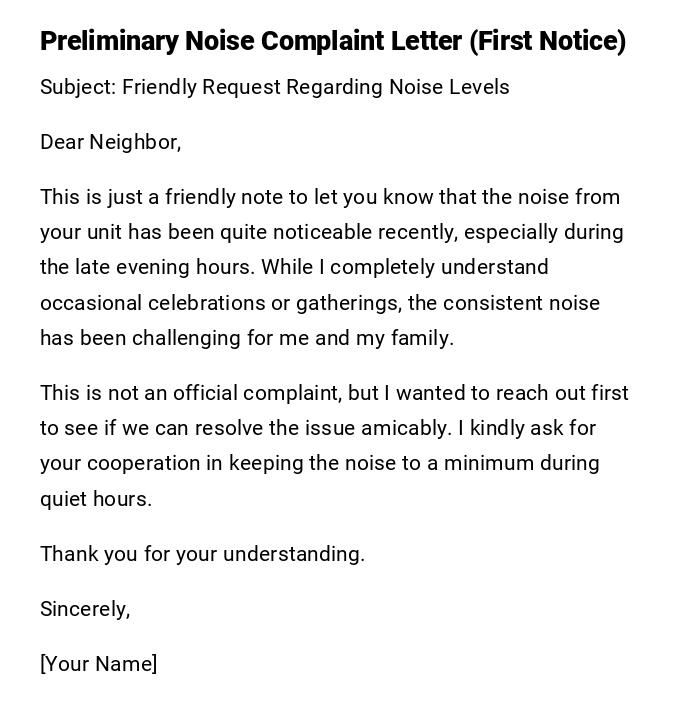

 Download Word Doc
Download Word Doc
 Download PDF
Download PDF